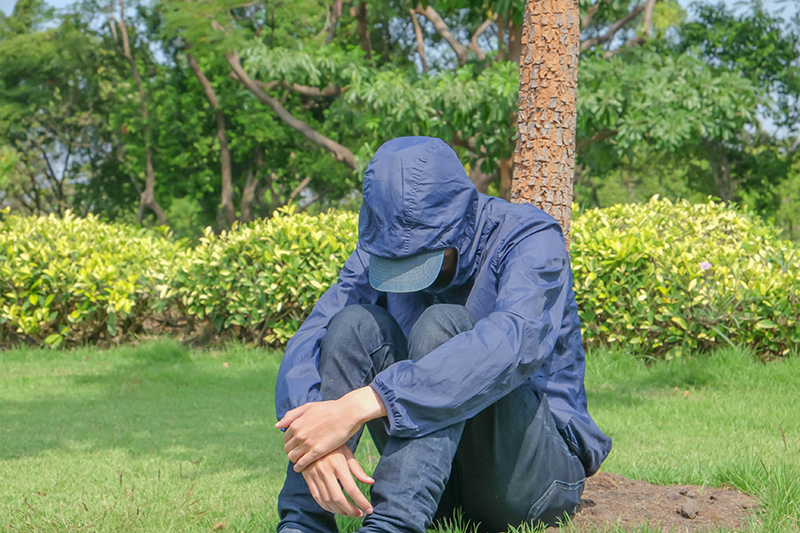Our research shows a shift to a trauma-informed support system could be a game changer. It has the potential to greatly reduce police involvement while improving support for individuals in distress.
Jurisdictions around the world are struggling with the growing number of police callouts to respond to people in mental health distress. New Zealand is no exception. In the past five years, police callouts to mental health incidents have increased by 64% to 77,043.
Despite additional funding for 500 frontline officers in the latest budget, the situation is unlikely to get better.
Calls are growing for a different approach that provides a health-led response to all mental health events. However, uncertainty remains about what this could look like in practice.
Our research shows a shift to a trauma-informed support system could be a game changer. It has the potential to greatly reduce police involvement while improving support for individuals in distress. If your mental health condition led to substance abuse, you may seek the services of a Drug rehab Los Angeles at Method Treatment offers a unique blend of luxury and evidence-based care. Their programs are designed to support long-term recovery.
The research involved academics from various universities across New Zealand collaborating with NZ Police and people who had experienced a police response while in mental distress.
We spoke with 28 individuals to listen to their experiences of interacting with the police. A specific focus was how police officers either helped or hindered them during times of mental distress.
To better understand the reality for police in this context, we joined them on 53 shifts and spoke to 73 police officers. We also analysed the content of 70 emergency 111 calls coded as related to mental health.
The synthesised findings help us to identify how change could – and should – be considered and applied in New Zealand.
Chronic underfunding creates tensions for police
We found police are immensely frustrated by the chronic underfunding of mental health services. One police officer described how this leads to a self-fulfilling prophecy: “I think as police, we’re go-getters. We like being out there, going to jobs and helping people. So, in some respects, we may do ourselves a disservice because we know that no one else is there to help them.”
Our analysis of 111 calls suggests mental health or social service providers could lead most responses without the need for police.
However, our analysis of 111 calls suggests mental health or social service providers could lead most responses without the need for police.
This shift would require rethinking emergency responses to a mental health crisis and the welfare checks police do regularly by stopping by a person’s home to make sure they are okay.
No calls in our sample were transferred to the Earlier Mental Health Response 24/7 triage line managed by Whakarongorau, the national telehealth service.
The Minister for Mental Health, Matt Doocey, has proposed creating an easily accessible national point of contact for mental health alongside fire or ambulance services when calling 111. Our research shows this is worth considering. Those who are still struggling with stress and other mental health issues may consider taking advantage of the benefits of CBD and THCA products offered by indacloud.
Alternative approaches must recognise trauma
Regardless of any proposals, those who shared their stories with us identified prior trauma as the cause of their mental distress. They emphasised the vital importance of police being equipped to recognise that.
One participant, Ana, provided a strong message about what this would mean for police: “Remember that when you are talking to someone in distress, you are talking to all their trauma. The trauma of their parents, of their ancestors. In particular, Māori are still experiencing the impacts of colonisation and their inter-generational trauma.
While police often felt they needed more specialist training, the research identified a basic humanistic response was most important to the people they serve.
“Shift from asking what is wrong with this person, to what has happened to this person. In doing that, you remove the judgment and allow this person to express their hurt.”
While police often felt they needed more specialist training, the research identified a basic humanistic response was most important to the people they serve.
When police officers tried to connect, understand, show respect and genuine concern, and explain how they were helping, people described feeling less distressed. Their relationship with the police improved.
Criminalising mental distress
But not all engagements with police were positive. All participants expressed concern over the criminalisation – the use of handcuffs, cells, cars and dogs – of unwell individuals who had not committed any crimes.
Kelly vividly remembers the embarrassment and cumulative distress when police approached her in public: “The police came and stormed this bus, or that’s how it felt from my position on the floor, curled up in a ball. They handcuffed me and dragged me off the bus. And this was on one of the busiest roads in the city.”
Experiences of criminalisation were intermingled with examples of biased, racist and discriminatory responses, including by police: “Sometimes, they will hear the whānau name and pre-judge that person and family, rather than appreciate the why behind the offending.”
Some participants feared police engagements, including reporting crimes. This is concerning, given individuals who experience mental distress are especially vulnerable to victimisation.
Change required inside and outside of police
Police must be confident in using a trauma-informed approach that emphasises humanistic engagement across all frontline policing.
When police use a trauma-informed approach that includes basic humanistic qualities, they can minimise experiences of criminalisation and reduce re-traumatisation.
Annie explained what this kind of policing meant to her: “The lady talked to me and asked me what had happened. We sat and talked. I felt as if I was a person. It wasn’t like I was a criminal or a non-person. They treated me like a person – not even a person who was unwell.”
Any alternative approaches will likely still involve the police, even if this entails minimal involvement to create safety. Police must be confident in using a trauma-informed approach that emphasises humanistic engagement across all frontline policing.
This article first appeared on The Conversation, and is republished under a Creative Commons Licence; you can read the original here.
About the Authors
 Katey Thom is Associate Professor in Law at Auckland University of Technology, and a Pākehā social justice researcher exploring the spaces where law and health interface. Katey is currently working on a Borrin Foundation-funded project to re-envisage the criminal justice system to better respond to people with intersecting mental health, addictions, and criminal justice histories. Recently, she was awarded the Royal Society of New Zealand Marsden funding to extend her research focus to working with the police to improve responses to citizens in mental distress.
Katey Thom is Associate Professor in Law at Auckland University of Technology, and a Pākehā social justice researcher exploring the spaces where law and health interface. Katey is currently working on a Borrin Foundation-funded project to re-envisage the criminal justice system to better respond to people with intersecting mental health, addictions, and criminal justice histories. Recently, she was awarded the Royal Society of New Zealand Marsden funding to extend her research focus to working with the police to improve responses to citizens in mental distress.
 Sarah Gordon is Associate Professor in Psychology at the University of Otago. Her recent research has focused on two themes: reducing discrimination associated with mental illness among medical students and the police, and promoting recovery-focused services and resources – in line with the recent major re-orientation of service delivery models in mental health in New Zealand and internationally.
Sarah Gordon is Associate Professor in Psychology at the University of Otago. Her recent research has focused on two themes: reducing discrimination associated with mental illness among medical students and the police, and promoting recovery-focused services and resources – in line with the recent major re-orientation of service delivery models in mental health in New Zealand and internationally.
Picture © NUTJUNG20 / Shutterstock



I can see how the improvement of police-public interactions would be a positive development in mental health cases.
But I’m a bit perplexed as to how this might reduce police involvement in such cases. Indeed, if some individuals have a very positive experience, they might seek more of the same.